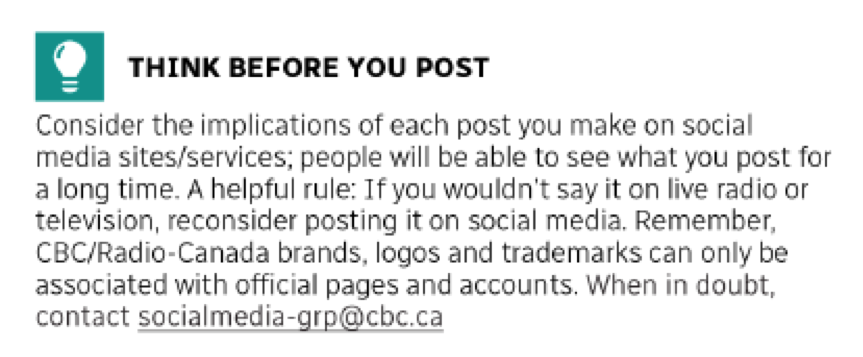Halifax freelancer’s firing an unfortunate reminder to watch what you tweet
An incident in Halifax this week is a sad reminder to freelancers everywhere of the dangers of social media.
A long-time freelance arts reporter had their radio columns at CBC canceled over a crude tweet about the son of Nova Scotia premier Stephen McNeil.
CBC has in place Code of Conduct and Social Media policies that have been criticized as being too far-reaching when it comes to the right to free speech, not only for employees but for freelancers as well.
While freelancers are not considered to be employees of the CBC, its Code of Conduct makes it clear that the same standards apply to them and other contract workers.
But the precarious nature of freelance work means that independent workers are without the protections afforded by employment standards or collective agreements when they run into trouble over public posts.
The CBC’s Social Media Guidance document offers advice to anyone involved in broadcast journalism:

(source: https://site-cbc.radio-canada.ca/documents/vision/governance/social- media-guidance-oct-2017-en.pdf)
Some aspects of freelance work at CBC, such as rates and contract terms, are covered by the Canadian Media Guild’s collective agreement. And Freelancers at the CBC are entitled to representation from Canadian Media Guild staff representatives as they are considered members of the union by virtue of the dues deducted from their fees.
However, the union has no power to protect freelancers from losing work because of social media posts — or because of any other reason.
Many in the arts community in Halifax are upset to have lost an important voice this week. One can argue that the penalty paid because of one ill-advised tweet was too severe, but in this instance the employer has the final say in the punishment.
Of course it’s not only freelancers who are at risk of losing employment over these types of incidents. The last decade has seen numerous examples of people who have lost full time jobs over a single tweet.
Freelancers are advised to remember that most situations allow an employer to drop a freelancer at any time for any reason. Be careful what you tweet.




on August 16, 2020 at 2:04 am
· Permalink
Storyboard is supposed to be a strong voice for freelancers. Instead of standing up for a veteran, accomplished freelancer and strongly calling out CBC for firing someone for one ill-advised tweet, you instead choose to post ‘watch what you tweet?’ Shameful. Won’t be following this site anymore, as you clearly care more about caving to employers rather than standing up for freelancers.
on August 16, 2020 at 12:08 pm
· Permalink
We all need to watch what we post on social media, and the rule mentioned above, that if you wouldn’t say it on-air or write it in a column or article, then it should not be posted on social media.
Think before you speak, or write, seems to be the rule here, and it’s one that needs to be followed more often.
If this reporter is a “long-time freelancer”, then she/he should have known the expected Code of Conduct and followed it.
on August 31, 2020 at 6:48 pm
· Permalink
What is a ‘crude tweet’, exactly? IF this person had been a ‘long time freelancer’ for the CBC, might it not be possible that he started working there BEFORE there was such a thing as social media? (In other words, he might not have been aware that the ‘code of conduct’ applied to him?) This is actually a case where a union (of some kind) might, in fact, have a legal case against the CBC or the employer.
on March 20, 2024 at 12:12 am
· Permalink
What a cautionary tale! This article underscores the importance of professionalism and mindfulness in our digital age. The repercussions of online behavior can be swift and severe, particularly for freelancers. It’s a sobering reminder to always think twice before hitting “send.” Maintaining a positive online presence is paramount, not only for personal reputation but also for career prospects. Let’s use this as a lesson to foster a culture of respect and responsibility in our online interactions. Thank you for shedding light on this pertinent issue.